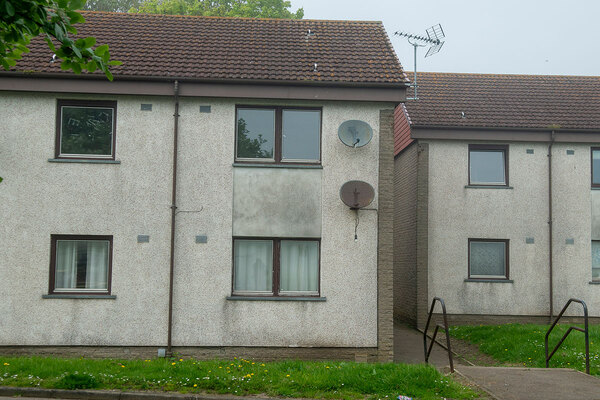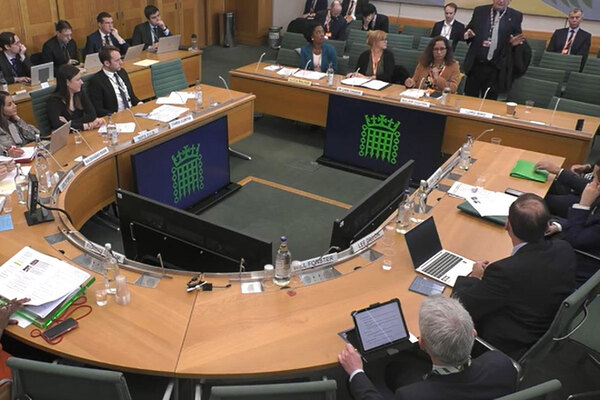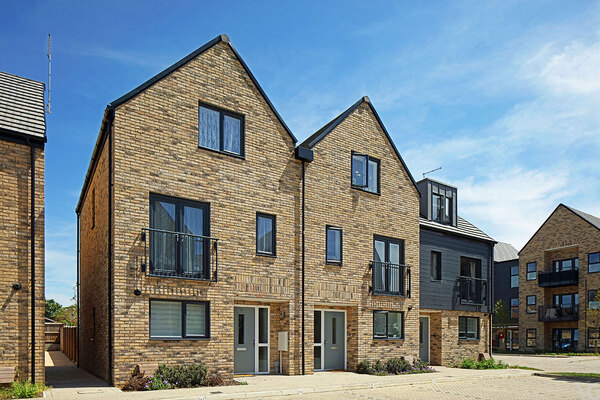You are viewing 1 of your 1 free articles
Regulatory judgements: London housing association downgraded for giving regulator inaccurate information
London housing association Origin Housing has been downgraded for providing “consistently inaccurate” information to the Regulator of Social Housing.
The English regulator gave the 6,700-home association a G2 rating for governance, meaning it is still compliant with standards but is expected to improve.
A judgement issued by the regulator said: “The errors made by Origin have related mainly to the source and availability of future loan drawdowns, and have therefore presented a material risk to the regulator of misunderstanding the organisation’s actual financial position.”
According to the regulator, this means that it cannot be sure that Origin’s board has “sufficient oversight”.
Carol Carter, chief executive of Origin, said: “This rating remains compliant with the regulatory standards and our financial position remains unchanged. Nevertheless, we will be working with the Regulator in the coming months to restore our G1 rating as swiftly as possible.”
The judgement was released as part of 14 regulatory judgements, including seven narrative judgements. There was also a regulatory notice for Gateshead Council, which revealed the local authority had breached the Home Standard over various safety issues in its housing stock.
A small housing association called Brunelcare, which provides extra care housing, care homes and domiciliary care and support to older people, was also found to have breached the Home standard.
According to the regulator, the 1,100-home association caused potentially “serious detriment” to its tenants over health and safety issues.
In a notice it said that a Brunelcare board report had found “wide-ranging” concerns about compliance with fire safety and electrical safety requirements. These, the regulator said, mainly related to the association’s following up on actions identified from health and safety checks.
The regulator added: “There was a failure to have in place effective systems, accurate data and an effective programme of planned work to address identified safety risks. Asbestos, legionella, fire and electrical safety issues arising from surveys and testing were not being recorded consistently or monitored and therefore there was a risk that they were not completed.
“There remains outstanding work, including actions categorised as high and medium risk, in relation to fire safety and electrical safety. Some of this work has been overdue for a number of years, and with the potential to affect a significant number of tenants.”
In a separate judgement, Brunelcare was also downgraded to a G2 rating for governance, with the regulator saying its board “has failed to manage its affairs with sufficient diligence and foresight”.
It also said that the association needs “to improve the quality of its stress-testing”, considering mitigation strategies for various risks that might cause the business to fail.
Kevin Fairman, chief executive of Brunelcare, said: “The safety and well-being of our customers is an absolute priority for Brunelcare. Work to address the potential risks raised in the regulator’s notice is already underway and we welcome the regulator’s recognition of this.
“I would like to stress that no customer has come to any harm as a result of any of the issues noted, and I have written to all of our customers to both reassure them and explain the actions we are taking.”
The Salvation Army Housing Association (SAHA) had its governance rating downgraded to G2 from G1 after the regulator decided it needed to improve “some aspects” of its governance arrangements.
The issues relate to SAHA’s merger with social landlord Chapter 1 in September 2017. Chapter 1 was not compliant with government and financial viability standards at the time, but SAHA worked to improve its position and succeeded in resolving its problems to the extent that it complied with regulatory standards.
However, the regulator said that the attention the board had to give to the transferred services and assets meant an increased focus on operational issues.
SAHA now needs to strengthen its strategic oversight across the whole of the business to ensure that it continues to “manage its affairs with an appropriate degree of skill, independence, diligence, effectiveness, prudence and foresight”, it said.
The regulator said while SAHA had started to make changes to strengthen its board’s strategic focus, these needed to be fully implemented.
The judgement also said that the company has an adequately funded business plan, and it was currently implementing a cost savings programme to improve financial performance.
But the regulator also flagged that SAHA operates in low-margin services and activities, leaving the business with “limited capacity to manage unexpected adverse scenarios”. It maintained its V2 financial viability rating.
SAHA has been contacted for comment.
Large housing association Orbit, which manages 42,400 homes across the Midlands, East and South East, maintained both its G1 governance rating and its V2 financial viability rating, although the reasons for its financial rating have been changed.
V2 is still compliant and the regulator does not require improvement on this grading.
The regulator said that while Orbit had the financial capacity to deal with a “reasonable range of adverse scenarios”, its cross-subsidy business model represented a risk to its financial stability.
The latest judgement said: “While treasury management changes since the last regulatory judgement have improved Orbit’s financial capacity, its development strategy remains predicated on cross-funding between affordable provision and a debt funded market sales programme.
“This gives rise to risks and exposures which Orbit has identified and which it will need to continue to manage.”
Orbit did not wish to comment on the judgement.
St Mungo Community Housing Association, which is the registered provider arm of the homelessness charity of the same name, saw its governance rating upgraded to a G1.
As part of its last judgement in November 2016, the regulator found that St Mungo needed to strengthen its internal control and compliance and oversight of key risks, including health and safety.
The latest report said that St Mungo had enhanced governance and oversight and made a number of improvements to risk management and internal control assurance. It also found its oversight and management of health and safety had been improved, and the board was much more aware of the risk environment in which it operates.
St Mungo financial viability rating was recorded as V2. The regulator said the organisation’s financial plans were consistent and the business plan was fully funded, however there remained risks that St Mungo needed to manage.
It said the low margin it operated on reduced the organisation’s ability to absorb adverse shocks, and that it was reliant on efficiency saving and growth in revenue to break even.
St Mungo has been contacted for comment.
Hundred Houses Society (HHS), which owns 1,252 homes, saw its governance assessment upgraded to G1, while its viability assessment was upgraded from V2 to V1.
In the last judgement of the association in July 2018, the regulator found there was room for improvement in the organisations asset management strategy and associated processes.
The latest judgement said that the organisation had made necessary improvements to its governance and its new leadership team had put in place effective asset management arrangements. It found in terms of financial viability HHS had an adequately funded business plan and its financial plans were consistent with its financial strategy.
Matt Thomas, chief executive at Hundred Houses, said :“This is great news for Hundred Houses. Alongside the Best Employers Eastern Region award for Most Improved company which we received last year, this represents really positive external validation for all the improvements that have taken place at Hundred Houses over the last few years and provides a great foundation for our future."
Update: at 10.07 on 24.4.19 This story was updated to include a comment from Mr Fairman of Brunelcare.
Update: at 14.57 on 24.4.19 This story was updated to include a comment from Ms Carter of Origin.
Regulatory judgements and notices published on 24 April 2019
| Provider | Governance | Viability | Explanation |
|---|---|---|---|
| Aster Group | G1 | V1 | No change |
| Bolton at Home | G1 | V2 | No change |
| Brunelcare | G2 | V1 | Governance downgrade and failure to meet Home Standard |
| Gateshead Council | N/A | N/A | Breach of Home Standard |
| Gateway Housing | G1 | V1 | No change |
| Hundred Houses Society | G1 | V1 | Governance upgrade and viability upgraded |
| Incommunities Group | G1 | V1 | No change |
| Orbit Group | G1 | V2 | No change |
| Origin Housing | G2 | V2 | Governance downgrade |
| Places for People Group | G1 | V1 | No change |
| Salvation Army Housing | G2 | V2 | Governance downgrade |
| Selwood Housing Society | G1 | V1 | No change |
| Settle Group | G1 | V1 | No change |
| Soha Housing | G1 | V1 | No change |
| St Mungo Community Housing Association | G1 | V2 | Governance upgrade |
| Thrive Homes | G1 | V1 | Viability upgrade |
Regulatory judgements in England explained
The Regulator of Social Housing publishes regulatory judgements for all providers owning 1,000 or more social housing homes.
These judgements set out whether the provider is complying with the regulator’s governance and financial viability standards.
The regulator carries out an assessment either through a scheduled in-depth assessment, or reactive engagement (in which the regulator acts following information about a provider).
It then awards the provider a rating from one to four for financial viability (V) and a separate rating from one to four for governance (G).
Providers must score two or higher in both categories to be judged as complying with the standards.
As providers have increasingly taken on more risk to cross-subsidise social and affordable housing delivery through market-facing activity, the regulator has changed a number of associations’ viability ratings from V1 to V2.
The regulator often categorises this kind of regulatory action as ‘regrades’ rather than downgrades. Click here to read more.
Key to ratings:
V1/G1: Compliant
V2/G2: Compliant
V3/G3: Non-compliant and intensive regulatory engagement needed
V4/G4: Non-complaint, serious failures, leading to either intensive regulatory engagement or the use of enforcement powers
Rating straplines in full:
Governance ratings:
G1: The provider meets our governance requirements.
G2: The provider meets our governance requirements but needs to improve some aspects of its governance arrangements to support continued compliance.
G3: The provider does not meet our governance requirements. There are issues of serious regulatory concern and in agreement with us the provider is working to improve its position.
G4: The provider does not meet our governance requirements. There are issues of serious regulatory concern and the provider is subject to regulatory intervention or enforcement action.
Financial viability ratings:
V1: The provider meets our viability requirements and has the financial capacity to deal with a wide range of adverse scenarios.
V2: The provider meets our viability requirements. It has the financial capacity to deal with a reasonable range of adverse scenarios but needs to manage material risks to ensure continued compliance.
V3: The provider does not meet our viability requirements. There are issues of serious regulatory concern and, in agreement with us, the provider is working to improve its position.
V4: The provider does not meet our viability requirements. There are issues of serious regulatory concern and the provider is subject to regulatory intervention or enforcement action.
Jargon-busting: some regulatory terms and what they mean
- Co-regulation: this means boards are responsible for deciding how to meet the regulator’s standards – the regulator does not prescribe how to do this
- Gradings under review list: a public list of providers under investigation who are at risk of being judged non-compliant with regulatory standards
- In-depth assessment: a planned inspection, in which the regulator assesses a providers viability, governance and approach to value for money
- Narrative regulatory judgement: a detailed explanation of the reasons behind a regulatory judgement. Narrative judgements are published where a providers’ viability or governance ratings have changed, or where RSH has particular issues or concerns.
- Reactive engagement: refers to the regulator reacting to complaints or allegations about a provider and taking action
- Stability check: an annual assessment of all providers owning 1,000 social homes or more. RSH uses accounts and statistical return data to check for any changes in a providers’ risk profile.
- Strapline regulatory judgement: where a provider is meeting the standards, and its governance or viability ratings have not changed since its previous judgement, the regulator does not publish a full judgement explaining its reasons for the gradings. Instead it just publishes the gradings themselves, in a ‘strapline’.











